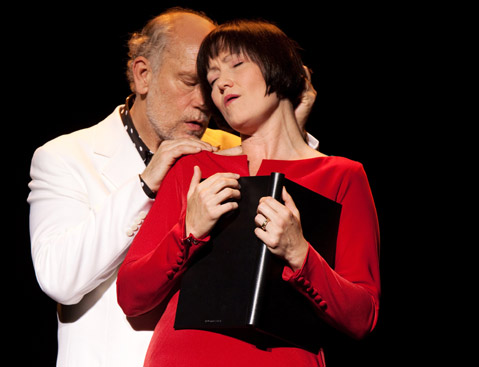John Malkovich in The Infernal Comedy at the Granada
The Actor Stars as a Serial Killer Opposite Singers and an Orchestra on Monday, October 3

Traditionally, the opera has permitted nearly anything; violence between men and women, murder, and even suicide are all familiar operatic plot developments. But what if the opera stage were opened further, so far that a real madman could enter, an incredibly evil villain from late-20th-century history, for instance? This is the premise of The Infernal Comedy: Confessions of a Serial Killer, the exciting hybrid of contemporary theater and baroque opera with which UCSB’s Arts & Lectures will open its performance series for the 2011-12 season this Monday at the Granada. Along with the Musica Angelica Baroque Orchestra, conductor Martin Haselböck, and two sopranos, John Malkovich will be taking the stage to play Austrian serial killer Jack Unterweger, a role that he has now performed more than 50 times for audiences around the world.
The Infernal Comedy should interest not only fans of Malkovich but also period music enthusiasts and anyone fascinated by cutting-edge developments on the cusp between classical music and drama. For the Malkovich crowd, there’s the thrill of seeing their hero enjoying himself hugely in theater, the medium that he considers his native element. For those interested in “music and more,” there’s the intrigue of seeing a world-class baroque ensemble and two serious singers attempt to hold the stage against a scene-chewing Hollywood star playing a total maniac.
Unterweger, who was imprisoned in 1976 with a life sentence for murdering a young girl, charmed his way to a parole in 1990, only to go on a second spree, murdering 11 more women on two continents in just two years’ time. During this time, Unterweger also adopted the unlikely persona of an expert on crime, and traveled to Los Angeles as a reporter, going on ride-alongs with the LAPD in red-light districts before striking there three times. Of playing Unterweger, Malkovich said, “I finally get the possibility to play a bad, bad guy, which I really like.” Malkovich marvels at Unterweger’s incredible double life, which he envisions as “a continuous series of screens, [with a public person, and] behind that screen a monster, and behind it a person, and behind that a monster.” And while it’s his performance that brings this creepy oscillation to life, the show’s dramatic action is the work of writer/director Michael Sturminger.
When I spoke with Sturminger by phone last week, he explained that the genesis of the show was largely musical rather than theatrical, even though the end product has become more of a play with music than an opera. He said that the idea for the piece began with a suggestion from Haselböck, the conductor of the Santa Monica-based Musica Angelica, who in 2008 asked Sturminger if there might be a way to connect the intensity and dark circumstances of certain baroque arias with the excitement and immediacy of contemporary acting.
“Martin [Haselböck] got me thinking about how we could use a 21st-century actor playing a contemporary character to revive the radical aspects of baroque opera for a new audience,” said Sturminger. While Malkovich as Unterweger alternately reads from his new novel and drifts into reveries of his encounters with his victims, music from Gluck’s Don Juan, Handel, Vivaldi, Boccherini, Mozart, and Beethoven is performed. Thus the killer’s love-hate relationship with women becomes entwined with the glamour, beauty, and aestheticized despair of the sopranos, who double as the killer’s victims.
Of playing opposite an orchestra and singers, Malkovich said, “It is kind of like having an incredibly perfect acting partner.” But the actor also noted that the consequences of the partnership could be negative as well as positive, saying, “Whenever you try to take too many liberties with it [the music], it’s like getting hit in the face with a moving house, because it just has so much power.” Addressing the moral issues raised by elevating a serial killer to the status of a major protagonist, Malkovich promised his audience the chance to judge Unterweger for themselves, saying, “People’s reactions will always be different. … The Infernal Comedy, for example, has had very different reactions in just about every city we have been in. You never know. Some people have seen the production as an attempt to glorify Jack Unterweger, but it is really not that.”
Whatever the verdict on Unterweger may be in Santa Barbara, The Infernal Comedy is likely to be judged a spectacular and provocative production.
4•1•1
The Infernal Comedy: Confessions of a Serial Killer will be at the Granada Theatre (1214 State St.) on Monday, October 3, at 8 p.m. For tickets and information, call 893-3535 or visit artsandlectures.ucsb.edu.



